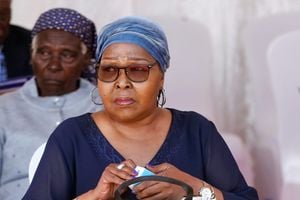
The late June Chebet with her brother, former Baringo Senator Gideon Moi.
Until her death on Thursday morning, June Chebet Moi had disappeared from the public eye. Unlike other members of the Moi family, who are either boisterous, reclusive or just plain rowdy, June was the quiet one. While she avoided controversy and was media-shy, the story of June Moi is only known within her circles.
But as a member of the Moi family, she benefited from the surname - and was always the target of shrewd businessmen keen to exploit her links to Moi's State House and her closeness to her father.
In his biography, Moi: The Making of an African Statesman, Moi's biographer Andrew Morton distinguished Moi and Lena's eight children with a rider: "There is an adopted daughter, June," said to have been adopted from a "poor" Tugen family.
That she was seen as 'adopted' within Moi's family was an indicator of how she was seen. Perhaps as an outsider with no blood ties.
The book reveals that Moi had many disappointments with his children, apart from Gideon Moi, the former senator for Baringo, and, interestingly, June.

The late June Chebet, daughter of former President Daniel Arap Moi.
According to Morton, “Moi has had little joy from his family. Those who know the family well observe that, with the possible exception of Gideon and June, the President feels disappointed and rather let down by his children.”
However, the source of Moi's disappointment was not clear - and those who expected Moi to favour those close to him in his will were rather disappointed.
In his will, Moi did not appear to favour Gideon or June (his two favourites) and instead left his wealth to his sons, apart from the one-off payment of Sh100 million to his three daughters, Jennifer, Doris and June. They were not to benefit from the future earnings of Kabarak University - the centrepiece of the Moi empire - which was to be run by a trustee.
Born in 1964, little is known about June, though she attended Kenya High School before she was taken abroad for her university studies. It is not clear whether she graduated.
June was not involved in the early Moi family drama, though those who knew her said she tended to associate more with Philip Moi. Unlike the eldest Jonathan, who had been left with Lena after Moi separated – and later divorced – June was, at first, regarded as the most promising. But it is in the business world where she would be tested.
Stories about June and her businesses emerged after she was involved in the oil trade as an associate of Mike Maina, the tycoon behind Nairobi’s Marble Arch and Kalpana Jai. The trio had started a company known as Fuelex Oil Company that distributed oil products to Rwanda and Burundi.
The matter came to the limelight after June took his partners to court, alleging that she was being sidelined. Fuelex Oil was registered in May 1994 and had an office in Nairobi’s Development House.
In the deal, June told High Court Judge Aaron Ringera that she was appointed the managing director of the oil firm on April 6, 1994. She had been asked to contribute Sh3 million and hold 30 per cent of the shareholding.
The bulk of her shares was quantified by the various licenses she was to procure—an indicator that June was to use the Moi name.
However, June alleged that after getting all the licenses, she was kept in the dark about the company’s operations. In their reply, the two directors told the court that June did not pay for her shares and was not entitled to the information she was requesting.
That June had some business dalliance with Maina, the reclusive city billionaire, was well known. In the Nyayo circles, Maina was the one with some Midas touch, and he was named in Parliament as having “grabbed” the land on which his hotel stands after demolishing a public toilet and taking over a plot owned by Kenya Taxi Cab Association.
More so, he had been named in the Karura Forest grabbing saga, and his Pelican Engineering Company was to build a mall inside the forest for President Moi and Hosea Kiplagat. Maina later had to fight suits brought by the National Social Security Fund – to whom he had sold the forest land.
In the Ndungu Report on the irregular land allocations in Kenya, June features prominently having been allocated plot no. 773 on June 21, 2002, measuring 8 acres in what was the degazetted part of Neissuit forest in Nakuru.
While the land was degazetted to settle the Ogiek community, much of the land ended up with politically correct individuals. The inclusion of June in that list would follow a pattern used by landgrabbers where prominent personalities would be awarded part of public land to get protection.
Moi knew that his children were using his name – or were being used by other people to get government contracts. As Andrew Morton noted, Moi at one point wrote a memo to government departments not to give Philip “any preferential treatment in the award of business contracts simply because of who he was.”
As Morton wrote, “It is wishful thinking to expect the boys, now all involved in various business projects, not to take advantage of the opportunities which come their way, or to believe that others will not cling to their coattails.”
The same had happened to Jennifer, who had a court battle over a 250-acre tea firm with the late Jacob Juma, a Nairobi-based windbag. Juma had wanted to swindle Jennifer on the farm.
However, her dalliance with a flamboyant Nairobi lawyer was well known—though the affair ended with some broken hearts. The lawyer managed to get closer to President Moi, mint millions, and walk away.
Her close associates also claim that she got pissed after Moi left her only Sh100 million, which she thought was too little.
Frustrated by her collapsing businesses and broken hearts, June had overindulged herself in tipple within the closed quarters of her home. She evaded public spaces and was not keen on politics like her other three siblings, the late Jonathan, Gideon and Raymond. Instead, she was as reclusive as Doris and John Mark.
At the time of her death, she was not closely associated with any of the Moi firms, though previously she managed the Kiptagich Tea factory, one of the controversial Moi companies located within Mau Forest.
June died 60 and has been mourned by the family, which released a two-sentence statement announcing her death and requesting for privacy at this time of mourning. The statement read: “We are deeply saddened to announce the passing on of our beloved, June Chebet Moi this morning.
At this time of grief, we request your prayers and privacy as we the family come to terms with the tragic loss of our sister. May her soul rest in eternal peace.”
While June was not a public person, her Moi links will undoubtedly catapult her into the limelight, which she had evaded for years.
[email protected] @Johnkamau1






